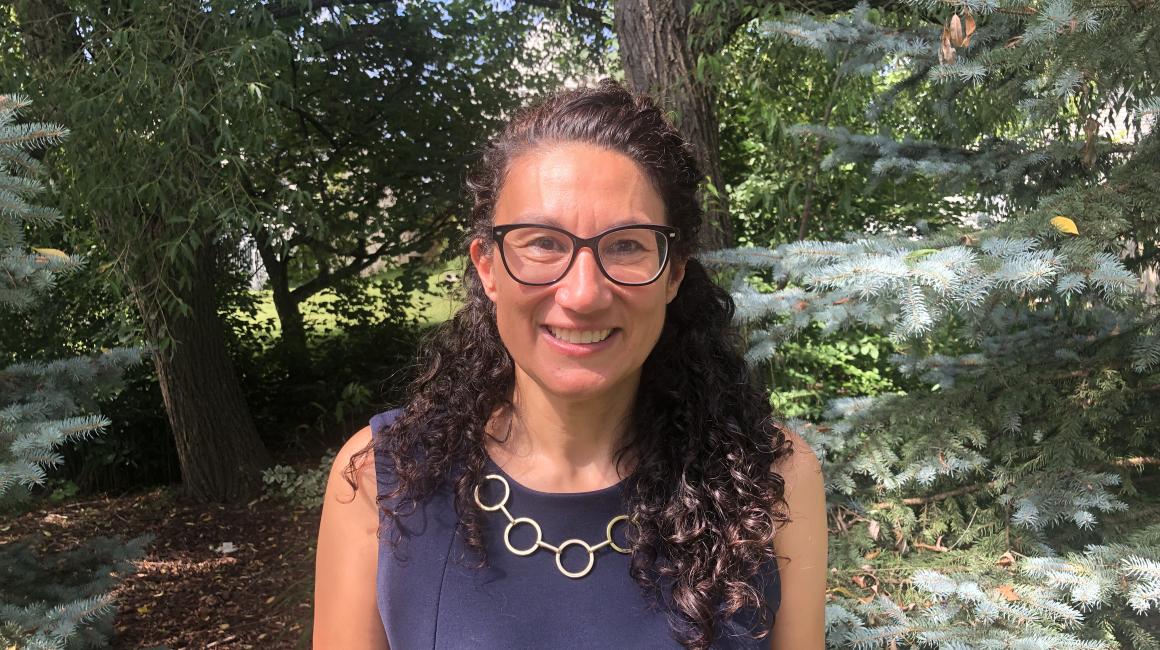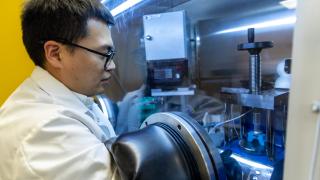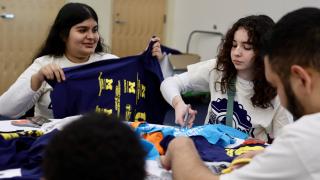
Due process for serious crimes like kidnapping, second-degree murder and Criminal Sexual Conduct are often depicted on television dramas like Law & Order.
But Andrea Berry McDaniel — through her legal experience — knows that real people are accused of these crimes and that these crimes happen to real people. People who have families, friends, colleagues and more. “From serious crimes to misdemeanors, I’ve defended people in all kinds of cases. But the ones that really spoke to me involved people who were not getting justly treated because they didn’t have access to the right resources.” McDaniel has also seen things from the other side, having worked as a city prosecutor for several years.
McDaniel, a lawyer who earned her Juris Doctorate nearly 25 years ago at Wayne State University, is UM-Dearborn’s Equity, Civil Rights and Title IX (ECRT) Office deputy director. The role — created last summer in an effort to strengthen the commitment to prevent sexual misconduct on campus at U-M — puts McDaniel right in the thick of process oversight, policy development and collaboration within the ECRT Office and across campus with a variety of partners.
Recently speaking with McDaniel, here are a few things to know about UM-Dearborn’s first ECRT deputy director.
Seeing injustice in court transcripts inspired her to represent people who need it most.
“One of my first jobs out of law school was with the Michigan Court of Appeals. Part of my job was reading transcripts for criminal cases on appeal. Even right out of law school, I could see that people with court-appointed counsel were not always getting great representation. I don’t want to place blame on the public defenders — I know they are overworked and do their best with the limited resources they have. The system in place does not prioritize funding to court-appointed legal services, which puts people who cannot afford to pay for counsel at a disadvantage. So I wanted to be a public defender.
At the time, Colorado had the death penalty (it was abolished in Colorado in 2020) and, therefore, a better funded public defender system. I went there to provide effective counsel for people who needed it. I wanted to do everything I could to make sure the system treated people fairly. These aren’t just cases. They are people who are fighting for their freedom.”
McDaniel also served as a prosecutor in Dearborn from 2014 to 2018. In 2018, she moved to higher education, realizing her experience could help bring justice forward.
“Representing criminal defendants and later serving as a city prosecutor helped me see how the judicial system works from both sides. Fairness and equity have always been important to me. So when I began to take notice of the sexual assault happening on college campuses — all college campuses, not specifically U-M — I wanted to go where I thought I could make a difference and became a Title IX investigator at UM-Ann Arbor. Neutrality is paramount to the work we do when it comes to equity work, and I knew that I could use my experiences and maintain neutrality while getting to the truth.
Although I initially wanted to work on sexual assault issues, ECRT addresses much more; I’ve had the opportunity to address issues of gender identity and expression as well as discrimination and harassment on the basis of race, national origin, age, disability, and weight (among other protected classes). I believe that we all deserve to be respected at work and in the classroom.
For people who haven’t been in a courtroom, defense attorneys and prosecutors are very often different from what you see on tv. No one rips people to shreds on the stand to get to the truth. It’s more important to have a calm demeanor and approach information thoughtfully. That’s my style anyway, and I’ve found that it works well in a university environment. ”
She has deep connections to Dearborn.
“I worked in the UM-Ann Arbor’s ECRT office prior to coming here in 2021. I’m very excited to be back in Dearborn. I have connections with the community. I was born at Oakwood (now Beaumont) and I have family here. It’s nice to be back in Dearborn regularly and visit all the great lunch spots. (Al Ameer is my favorite). I’m also excited that Dearborn elected Mayor Abdullah Hammoud and I’m looking forward to seeing the changes his new administration makes.
The UM-Dearborn community has truly welcomed me since I began here in October. I really like being part of a smaller campus community. Even though we are smaller than Ann Arbor, I’m impressed with the amount of resources we have, and how much everyone here works together to make sure our students have what they need to be successful.”
When it comes to thinking on her feet, she gives credit to a summer job.
“When in college (at UM-Ann Arbor), I worked at Greenfield Village. I was one of the people who dressed up and interacted with guests in the houses and buildings — like the Wright Brothers Cycle Shop or Thomas Edison’s Menlo Park Laboratory — for a couple of summers. I didn’t know it at the time, but it was great practice for a career in the law. You have to be prepared to share information and be confident in speaking roles. In court, sometimes a judge will ask a question and you have to respond quickly. It was the same type of thing when an electrical engineer came into Thomas Edison’s laboratory and wanted to know about his lighting system. You have to recall information, apply it to the question, and be prepared for anything. That was a cool summer job and one that you can only have in Dearborn.”
If you have concerns regarding equity issues and resources, McDaniel wants you to consider reaching out.
“Sometimes when we have an issue, we aren’t sure what to do or where it goes. If you have a concern, come to us and we’ll help connect you with the resources to address it even if our office isn’t the right place. Reaching out is the first step. Many people who experience discrimination — age, race, gender, veteran status, sexuality and more — or sexual assault have later reported in surveys that they don’t tell anyone — not a friend, not a therapist, no one, which saddens me. In addition to the ECRT office, UM-Dearborn staff, faculty and students have access to confidential resources like CAPS, FASCCO and Ombuds.
For offices and departments wanting to learn more about how to create inclusive spaces, Human Resources has a great program called Change It Up.
One of the first things I did when I started here is update the Our Community Matters Resource Guide. It helped me learn what we have on campus, but also assured our office that everything was up-to-date. That’s crucial because it takes courage to reach out and we don’t want to create obstacles, like an incorrect phone number. The ECRT office plans to expand trainings, especially for employees, starting this fall. I’m looking forward to meeting more people in our wonderful UM-Dearborn community as we all work toward being the change we want to see in the world."
Article by Sarah Tuxbury.


